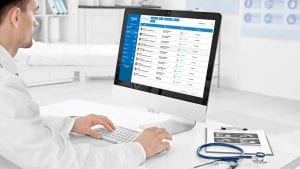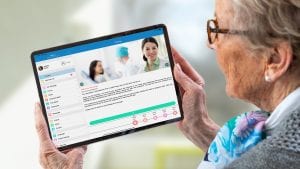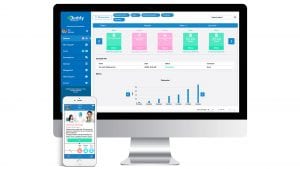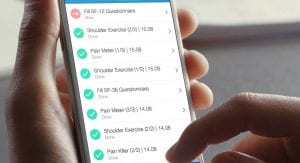
Markus Lind, Chief Sales Officer at Buddy Healthcare, shows how surgery clinics can restart elective surgeries safely and automate care co-ordination processes.
As the global COVID-19 pandemic continues to cut a swathe through healthcare services, many hospitals have reported that patients will face much longer waits for procedures. In June 2020, medical publication KMA magazine reported that 70,000 surgeries have been postponed in Germany each week since March1. Some hospitals in the UK have predicted that it may take several years before waiting times to get back to pre-COVID levels2. There is not a much better time to deploy telemedicine solutions which can automate surgery patients’ care pathway co-ordination, allow remote monitoring, and offer a contactless and secure platform to interact with patients remotely.

The Perioperative Patient Management Platform
Use of Buddy Healthcare’s Perioperative Patient Management Platform supports surgery clinics in automating patient communication and care coordination from referral to recovery. The company’s solution addresses some of the recent challenges clinics face regarding surgeries: ensuring that patients are symptom-free before an operation, administrative work reduction, late cancellations and no-shows identification, quick new replacing patient preparation, and healthy patients’ stress and anxiety reduction. The platform’s use of automated surgical care pathways enable hospitals to shorten waitlists, thereby shoring up hospitals’ overall efficiency and supporting the right of patients to access the care they need at the earliest possible time.

This is what surgery care co-ordination should be in 2020
The Perioperative Patient Management Platform, which has been co-developed with university hospitals, provides educational media for patients; digitises, sends and collects forms and questionnaires on patient-reported outcomes and experiences; and offers a real-time, 360-degree view of users’ care pathways and activities. All the care co-ordination work which has traditionally been done through mailed documents and phone calls can now be automated and digitised through the platform’s automated surgical care pathways. Now more than ever, hospitals need to improve their operational efficiency while still keeping care quality and patient experience at a high level.
The patient-facing mobile app gives patients 24/7 access to all the essential care-related information they need; and provides timely automated reminders and push notifications to keep patients on track. Patients’ preoperative stress and anxiety have been found to decrease through their use of the platform, which improves patient guidance, provides a clear and transparent care process, and enables sending messages to the care personnel from the app.

Remote monitoring and data collection optimises the patient experience
Remote patient monitoring can help care personnel to identify patients’ eligibility for surgery or potential cancellations. The data submitted through the mobile apps can, for example, reveal if a patient has COVID-19 symptoms or is about to deviate from the care pathway. The digitised communication facilities on offer through the platform accelerates and streamlines the process of preparing patients for clinical care.
The safety of patients and care personnel must be paramount, especially while COVID-19 remains an ever-present threat. In order to screen for COVID-19 symptoms without the need for time-consuming phone calls, an integrated symptom tracker can be implemented in traditional surgery pathways to help hospitals to identify possible infected patients before hospital admission. The patient-facing mobile app requests patients to submit daily symptom questionnaires before the surgery takes place. The monitoring dashboard collects all reported symptoms submitted by patients and issues an alert when the hospital’s set specified thresholds are exceeded.
What are the key benefits to patients offered by the BuddyCare mobile app?
Buddy Healthcare’s mobile app facility provides comprehensive, easy to use facilities for patients to navigate their care pathways and access pertinent information relating to their care. It can deliver push notifications through the patient’s smartphone with alerts and information pertaining to administrative forms and checklists; information and advice on medication and wound care; information on scheduled operations; rehabilitation exercises; in-app patient experience questionnaires and a pain meter; as well as allowing the patient to communicate with their care team through a secure messaging service.
Patients using the BuddyCare app reported:
- Increased transparency over the care process;
- 24/7 availability, meaning patients are able to access the information and guidance they need at any time, without the need to observe hospital opening hours;
- Greater convenience offered by the in-app messaging facility, in comparison with contacting care staff by phone – patients who used the app’s messaging service reported they were more likely to engage with the process than they would be if the only method of communication was by phone;
- Patients feel a greater sense of safety, with many users reporting they felt better cared for in the knowledge that they could engage with care personnel at any time; and
- Improved overall wellbeing: in addition to feeling safer, patients reported reduced levels of tension and anxiety in the time leading up to surgical procedures, as the information provided by the app demystified the process for them.

How can the BuddyCare Care Co-ordination and Patient Engagement Platform help clinical staff?
In recent months, remote care and treatment of patients has become increasingly prevalent – and increasingly necessary. In addition to providing a medium for clinicians to engage with and monitor patients remotely, the BuddyCare platform facilitates automated care co-ordination processes and collects essential patient data. Clinicians reported benefits arising from their use of this platform including:
- The app’s secure messaging service renders it significantly easier to contact patients without the restrictions imposed by office hours: calling patients has historically posed an obstacle for clinicians, as patients may be unable to answer the phone at work or reluctant to take a call from a number they do not recognise. The messaging function addresses these challenges by allowing patients and practitioners to communicate at a time when it is convenient for each party;
- The remote monitoring capability on offer through the platform accords care teams an overview of patient’s care pathways in real time, including key data showing the patient’s degree of compliance with their care protocols;
- The ability to assess patients’ level of engagement with the guidance provided by their care teams, including alerts issued by the platform if a patient deviates from their care pathway, enables clinical staff to identify and avert potential no-shows and cancellations;
- BuddyCare offers a tangible contribution to the cost effectiveness of clinical facilities, both by allowing care staff to promptly schedule new patients in cancelled appointment slots and by collecting patients’ health data remotely in advance, which reduces the number of unnecessary referrals for lab tests; and
- The app saves clinical staff time by cutting the hours they spend on the phone with patients and collecting patient forms and questionnaires, thereby freeing up staff to conduct other tasks.
Can hospital management teams benefit from implementing the BuddyCare platform?
Management staff in hospitals where the BuddyCare platform has been introduced have reported positive experiences in terms of economic concerns, staff management and patient care. The list of benefits highlighted by management teams includes:
- Reductions to administrative workloads, due to the lowered need for phone calls occasioned by the in-app messaging service and the platform’s automated collection of patient questionnaires and forms;
- Cost reductions arising from the lowered administrative burden and the ability to reschedule and prepare new patients for procedures which have been cancelled at short notice;
- Consistency across the chain of care is improved and upheld by the use of the app to both communicate with patients and store data – this in turn allows managers to evaluate patient-reported outcomes and experiences through a consistent lens; and
- The platform allows management teams to optimise resource planning and allocation; and paves the way for further automation of processes going forward.
Automated pre-operative screening functionality
Using an activation code provided by the hospital, patients log into the app, which then enables them to access the relevant pre-surgery forms and educational media. The embedded COVID-19 symptom checker issues daily questionnaires which screen for common symptoms of the virus, asking patients if they are feverish, coughing, experiencing respiratory issues, or have lost their sense of smell or taste.
The platform enables care staff to access a remote monitoring dashboard, which they can use to view patients’ data and symptom status. Once a patient’s symptoms have reached a threshold set by the hospital, the dashboard issues an alert that the patient is an infection risk: once care personnel have been informed of this risk, they can adapt the patient’s care protocols accordingly. The process of collecting data on patients’ reported symptoms is wholly automated; and can be customised to meet the hospital’s specifications. Through the use of this solution, hospitals can automate symptom collection, identify and trace infected patients earlier; and reschedule new appointments for replacement patients more quickly.
To book a demonstration session with our expert, please click here: www.buddyhealthcare.com/demo-booking
References
1 Klinik Management Aktuell, issue number 25, June 2020, p. 25
2 The Guardian, June 27, 2020. It’ll take four years for NHS to recover from COVID-19, health chiefs warn. https://www.theguardian.com/society/2020/jun/27/itll-take-four-years-for-nhs-to-recover-from-covid-19-health-chiefs-warn
Markus Lind
Buddy Healthcare
info@buddyhealthcare.com
www.buddyhealthcare.com
This article is from issue 14 of Health Europa. Click here to get your free subscription today.









